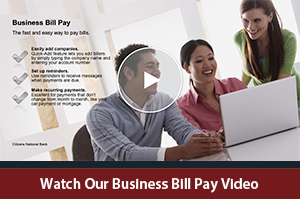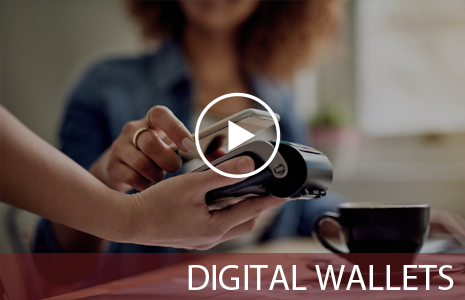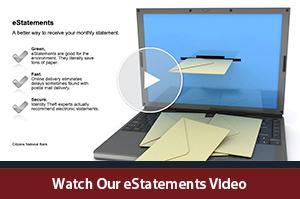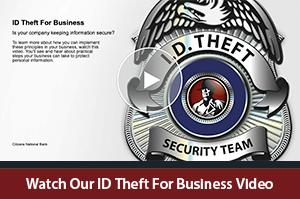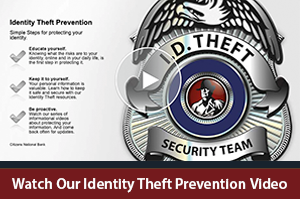Fraud
Millions of people are defrauded every year by criminals using clever schemes.
Tips to Stay a Step Ahead
Spot imposters.
Scammers often pretend to be someone you trust, like a government official, a family member, a charity, or a company you do business with. Don’t send money or give out personal information in response to an unexpected request — whether it comes as a text, a phone call, or an email.
Do online searches.
Type a company or product name into your favorite search engine with words like “review,” “complaint” or “scam.” Or search for a phrase that describes your situation, like “IRS call.” You can even search for phone numbers to see if other people have reported them as scams.
Don’t believe your caller ID.
Technology makes it easy for scammers to fake caller ID information, so the name and number you see aren’t always real. If someone calls asking for money or personal information, hang up. If you think the caller might be telling the truth, call back to a number you know is genuine.
Don’t pay upfront for a promise.
Someone might ask you to pay in advance for things like debt relief, credit and loan offers, mortgage assistance, or a job. They might even say you’ve won a prize, but first you have to pay taxes or fees. If you do, they will probably take the money and disappear.
Consider how you pay.
Credit cards have significant fraud protection built in, but some payment methods don’t. Wiring money through services like Western Union or MoneyGram is risky because it’s nearly impossible to get your money back. That’s also true for reloadable cards (like MoneyPak or Reloadit) and gift cards (like iTunes or Google Play). Government offices and honest companies won’t require you to use these payment methods.
Talk to someone.
Before you give up your money or personal information, talk to someone you trust. Con artists want you to make decisions in a hurry. They might even threaten you. Slow down, check out the story, do an online search, consult an expert — or just tell a friend.
Hang up on robocalls.
If you answer the phone and hear a recorded sales pitch, hang up and report it to the FTC. These calls are illegal, and often the products are bogus. Don’t press 1 to speak to a person or to be taken off the list. That could lead to more calls.
Be skeptical about free trial offers.
Some companies use free trials to sign you up for products and bill you every month until you cancel. Before you agree to a free trial, research the company and read the cancellation policy. And always review your monthly statements for charges you don’t recognize.
Don’t deposit a check and wire money back.
By law, banks must make funds from deposited checks available within days but uncovering a fake check can take weeks. If a check you deposit turns out to be a fake, you’re responsible for repaying the bank. Sign up for free scam alerts from the FTC. If you spot a scam, report it. Your reports help the FTC and other law enforcement investigate scams and bring crooks to justice.
Resource: 10 things you can do to avoid fraud.
Recent Financial Scam Examples
Advance Fee Scam
Fraudster states that the victim is getting a large Government Grant, but they first need to go purchase Bitcoin. When the victim says they can’t do that, the fraudsters then instruct them to get gift cards from various places, such as Apple and Walmart in order to cover expenses. The victims are then instructed to text the fraudster back with the numbers on the cards. Initial contact for this victim was via phone, but after that, all correspondence was via SMS text messaging.
Tech Support Scam
Fraudster calls victim claiming to be from Microsoft, gains access to the victim’s computer, charges them $500 (amounts are just for purposes of an example) for removing a virus from their PC, then tells the victim that they accidentally charged the victim too much and when the fraudsters refunded the money, they refunded $4,500 instead of $500 and now needs the victim to purchase gift cards for at least a portion of the “over-refund”. In the meantime, the fraudster has transferred $4,000 from the victim’s savings account via the victim’s online banking account, and thus, the victim “sees” the “over-refund” of $4,000 in their account. The fraudsters will generally tell the victim “keep X amount for your trouble”.
Debt Relief Scam
Victim looking online for a loan to pay off credit cards, obtains loan from one legitimate financial institution, and then gets calls from three other “financial institutions” offering to pay the credit cards off for the victim and that would increase the victim’s credit score. Victim provides credit card information to the fraudsters. Fraudsters “pay off” credit cards, and tells the victim to repay the funds. They then proceed to obtain victim’s online banking information and begin depositing fraudulent checks via mobile deposit into victim’s account. Fraudsters then advised victim to get gift cards from different stores and call them back with the numbers of the cards. Victim complied, but after we (the Bank) notified victim that it was a scam and victim stopped complying, the fraudsters threatened the victim with imprisonment, fines and suspension of the victim’s driver license.
Prize, Sweepstakes, & Lottery Scam
Victim is called saying they won a large prize. Fraudster poses as an employee of the bank (similar name as a real employee who the victim knew), and tells victim that the IRS is at the Bank looking at the victim's account and the victim needs to go open an account at another (“big” bank – e.g. Wells Fargo, Bank of America, etc.) so they will not find out about the prize money. Victim complies, then writes a check off of the “big” bank, deposits in the victim's account with us, then withdraws the cash to purchase $1,000 USPS money orders and various other gift cards. Victim is instructed to deposit the USPS money orders into a fraudster’s account at a different “big” bank, of which the victim complies. In the meantime, the check the victim wrote off their new account at the “big” bank is returned, leaving the victim moneyless.
Protect Yourself from Identity Theft
Identity theft occurs when someone assumes your identity to perform a fraud or other criminal act. Criminals can get the information they need to assume your identity in a variety of ways, including by stealing your wallet, sifting through your trash, or by obtaining your credit or bank information. They may approach you in person, or contact you by telephone, or via the Internet and ask you for the information. The sources of information about you are so numerous that you cannot prevent the theft of your identity, but you can minimize your risk of loss by following a few simple rules:
Tips for Avoiding Identity Theft
- Never throw away ATM receipts, credit cards or statements, or bank account statements or notices in a readable form.
- Always shred or mutilate sensitive documents before disposing of them.
- Never give your credit card number over the telephone unless you make the call.
- Reconcile your bank account at least monthly — and notify Citizens National Bank of discrepancies immediately.
- Keep a list of telephone numbers to call to report the loss or theft of anything containing sensitive information, such as your wallet, credit cards, etc.
- Report unauthorized financial transactions to Citizens National Bank or your credit card company, and the police as soon as you detect them.
- Review a copy of your credit report at least once each year. Notify the credit bureau in writing of any questionable entries and follow through until they are explained or removed. You may visit annualcreditreport.com for one-stop shopping to access your FREE report from each of the three credit bureaus.
- If your identity has been stolen, ask the credit bureau to add a statement as such to your credit report. This is called a “fraud alert.”
- If you know of anyone who receives mail from credit card companies or banks in the names of others, report it to local or federal law enforcement authorities.
REMEMBER: Citizens National Bank will never call you to request your PIN number, passwords, account or Social Security Number, or any other non-public personal information. If anyone calls claiming to be with Citizens National Bank and requests this information, please record their name and phone number and call your local Banking Center.
Resources
Report identity theft immediately. For more information, visit the Federal Trade Commission.
Mobile Security Tips
- Use passcodes to protect mobile devices and enabling screen-lock features after inactivity
- Turn off mobile features that are not being used
- Before downloading any app in Android market, read reviews about the app developer or company publishing the app — and understand user app permissions that will be allowed once the app is downloaded
- Install mobile malware protection
- Install anti-virus and file integrity software
- Turn off geo-location when not in use
- Avoid connecting to unknown wireless networks, as they could be rogue access points that capture information passed between your device and a legitimate server
- Reset or wipe devices before they are sold or traded
- Keep smart-phone software patches and upgrades up to date
- Avoid links or software downloads from unknown sources
- Use the same precautions on a mobile device as you would use on a PC
Elder Financial Exploitation
As defined by the Older Americans Act, elder financial exploitation is the fraudulent or otherwise illegal, unauthorized, or improper actions by a caregiver, fiduciary, or other individual in which the resources of an older person are used by another for personal profit or gain; or actions that result in depriving an older person of the benefits, resources, belongings, or assets to which they are entitled. Plainly stated, it is the theft of money, property or belongings.
Examples of Financial Exploitation
- Misusing or stealing someone’s money or property
- Coercing or deceiving someone into signing documents such as a contract or will
- Improperly using conservatorship, guardianship, or a power of attorney
- Withdrawing money without approval
- Sudden changes in a will or other financial documents
- Unexplained missing funds or valuables
- Unpaid bills despite having enough money
- Forging of a signature for financial transactions or for the titles of property
- Investment fraud and scams, including deceptive “free-lunch seminars” selling unnecessary or fraudulent financial services or products
- Contractor fraud and home improvement scams
- Reverse Mortgage fraud
- Lottery and sweepstakes scams
- Scams by telemarketers, mail offers or door-to-door salespersons
Who May Exploit Others?
- Family members
- Caregivers — paid or volunteer
- Neighbors or friends
- Financial advisors
Protect Yourself from Financial Exploitation
- Don’t sign blank checks allowing another person to fill in the amount.
- Don’t leave money or valuables in plain view.
- Watch out for scams by phone, mail or email. If it sounds too good to be true, it probably is.
- Don’t give strangers access to your bank accounts.
- Check your financial statements often and carefully for withdrawals you did not approve.
- Don’t sign any document you have not completely read or don’t fully understand.
- Don’t be pressured by family, friends, caregivers, or anyone to do anything you don’t want to do
Resources
CFPB (Consumer Financial Protection Bureau)
Adult Protective Services or 1-800-252-5400
Computer Security
Identity thieves, hackers, and scammers are looking to steal your personal information and money.
How to Protect Yourself
- Update your computer software like your operating system, web browsers, and apps.
- Protect your personal information. Don’t hand out your Social Security number, credit card number, and bank account number just to anyone. Every time you are asked for personal information think about why someone needs it.
- Protect your passwords. Have a good strong password, and don’t share your password with others. Legitimate companies will not ask you for your password.
- Consider turning on two-factor authentication. For accounts that support it, two-factor authentication requires both your password and an additional piece of information to log in to your account.
- Give personal information over encrypted websites only. When shopping or banking online stick to sites that use encryption.
- Back up your files. Keep a copy of your files on an external hard drive or cloud storage.
Resource consumer.ftc.gov/articles/0009-computer-security
Malware
Malware includes viruses, spyware, and other unwanted software that gets installed on your computer or mobile device without your consent. Criminals use malware to steal personal information, send spam, and commit fraud. There's a lot you can do to protect yourself and your computer. One of the most important steps you can take is to install security software, such as anti-virus and anti-malware, from a reputable company and set it to update automatically. Criminals are constantly developing new ways to attack your computer, so your software must be up to date in order to best protect you and your personal information.
Learn more about avoiding, detecting, getting rid of and reporting malware.
Resources
consumer.ftc.gov/media/video-0056-protect-your-computer-malware
Phishing
Phishing is when a scammer uses fraudulent emails or texts, or copycat websites to get you to share valuable personal information – such as account numbers, Social Security numbers, or your login IDs and passwords. Scammers use your information to steal your money or your identity or both. Phishing scammers make it seem like they need your information or someone else’s, quickly – or something bad will happen.
Tips to Avoid a Phishing Scam
- Be cautious about opening attachments or clicking on links in emails. Even your friend or family members’ accounts could be hacked.
- Make the call if you’re not sure. If you think a company, friend or family member really does need personal information from you, pick up the phone and call them yourself using the number on their website or in your address book, not the one in the email. Do not respond to any emails that request personal or financial information, especially ones that use pressure tactics or prey on fear.
- Do your own typing. Rather than merely clicking on the link provided in the email, type the URL into your web browser
- Turn on two-factor authentication. For accounts that support it, two-factor authentication requires both your password and an additional piece of information to log in to your account.
Report Phishing Emails & Texts
- Forward phishing emails to [email protected] – and to the organization impersonated in the email. Your report is most effective when you include the full email header, but most email programs hide this information. To ensure the header is included, search the name of your email service with “full email header” into your favorite search engine.
- You can also report phishing email to [email protected]. The Anti-Phishing Working Group – which includes ISPs, security vendors, financial institutions and law enforcement agencies – uses these reports to fight phishing.
Resource
consumer.ftc.gov/articles/0003-phishing
How to Report Cyber Crime
- The Internet Crime Complaint Center
- Federal Trade Commission FTC: ID Theft or 1-877-IDTHEFT (1-877-438-4388)
- Contact your local law enforcement office




